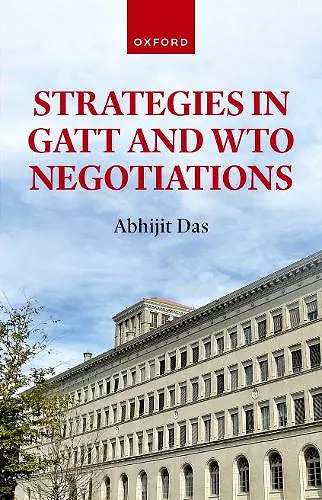Strategies in GATT and WTO Negotiations
Format:Hardback
Publisher:Oxford University Press
Published:30th Mar '25
Currently unavailable, and unfortunately no date known when it will be back

Over the past seven decades, the outcome of international trade negotiations at the General Agreement on Tariffs and Trade (GATT) and the World Trade Organization (WTO) have significantly influenced economic policymaking world over. With unparalleled access to first-hand accounts of key negotiators from India and other developing countries,Strategies in GATT and WTO Negotiations systematically identifies and analyses the strategies and tactics deployed by the main players at the GATT/WTO negotiating table, particularly from the perspective of developing countries. It decodes the role that strategy plays in the developed countries prevailing in WTO negotiations on most occasions and demystifies the factors and strategies underlying the rare successes of many developing countries in countering entrenched power dynamics at the GATT and WTO negotiating table. Moreover, it includes a fascinating analysis of action behind the scenes and the strategies deployed by many developing countries in securing their key negotiating objectives on three specific issues in the Doha Round of the WTO, namely, the Singapore issues, agriculture, and food security.
This volume offers a unique record of India's role in multilateral trade negotiations. As importantly, it offers an invaluable analysis and template of negotiating strategies and tactics that will be indispensable reading for negotiators from across the Global South. * Dr. Rob Davies, Former Minister of Trade and Industry, South Africa *
Abhijit Das masterfully draws back the veil on the complex and largely invisible world of trade negotiations to examine developing countries' attempts to protect and advance their interests, successfully and otherwise, in the face of the systemic asymmetries and power politics of the WTO. There's no hyperbole, just an exceptionally lucid and insightful analysis of actual events and insiders' accounts over several decades. Das's guidelines to negotiators will empower developing countries and civil society alike as they confront an even more fractured WTO. * Prof. Jane Kelsey, Emeritus Professor, University of Auckland *
Trade negotiation is a complex art, where an in-depth understanding of the subject under negotiation is as important as insights into the relevant political economy. I have not encountered literature that touches on the theory and practice of international trade negotiations in such depth. Abhijit has the distinct advantage of having been an insider to a national trade establishment and yet having seen trade negotiations from the unbiased position of a trade academician. It is not surprising, therefore, that this book draws theoretical nuggets from a strong experiential foundation. A must-read for all practitioners and enthusiasts of trade negotiations. * Rajeev Kher, Former Commerce Secretary of India *
The book fills a very important void in international trade law and practice, providing comprehensive guidance on issues related to WTO negotiations. It approaches some very technical and complex subjects related to international trade and the WTO in a simple, lucid, and engaging way, bringing out their essence without burdening the reader with unnecessary details and technicalities. It is commendable for its comprehensive sweep and depth as well as its analytical rigour. * J.S. Deepak, India's former ambassador to the WTO *
This will be an invaluable go-to book, and a must read for trade policy practitioners, economists, political scientists, academics, and just about anyone interested in understanding why international trade negotiations are so complex and take a long time to conclude. * Dr. Jayant Dasgupta, India's former ambassador to the WTO *
The book provides excellent conceptual, empirical, and practical arguments to demonstrate that despite the limited room to maneuver for the developing world in multilateral trade negotiations, it can still better its outcomes through careful use of many negotiation strategies and tactics. The narrative is rich in experiences and histories of negotiations. * Prof. J.P. Singh, Distinguished University Professor, Schar School of Policy and Government, George Mason University; Richard von Weizsäcker Fellow, Robert Bosch Academy, Berlin *
This is a book that has been sorely missing in my bookshelf. Abhijit Das must be congratulated for offering a comprehensive analysis of strategies and tactics deployed by key players at the GATT/WTO negotiations. The most exciting aspect of the book is the analysis of action behind the scenes. It closes the gap on how the strategies and tactics work out in the real world of international trade negotiations. * Prof. Diana Tussie, Director of International Relations Area, Facultad Latinoamericana de Ciencias Sociales, Argentina *
ISBN: 9780198934400
Dimensions: 24mm x 140mm x 216mm
Weight: 525g
354 pages